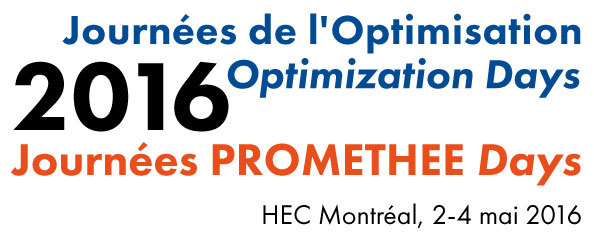
Journées de l'optimisation 2016
HEC Montréal, Québec, Canada, 2 — 4 mai 2016

TB9 Game Theory
3 mai 2016 15h30 – 17h10
Salle: Pricewaterhouse Coopers
Présidée par Samar Garrab
4 présentations
-
 15h30 - 15h55
15h30 - 15h55Learning and forgetting in a competitive environment with spillovers
It has been shown that learning-by-doing enables firms to reduce marginal production costs, but that this effect weakens due to organizational forgetting. In order to assess the impact of both learning and forgetting on long-term competitiveness and a firm’s profitability, we model an experience accumulation process with depreciation and consider a differential game between two competing firms that produce fully substitutable products.
-
 15h55 - 16h20
15h55 - 16h20Stable climate coalitions and Stackelberg information structure
We consider in this paper an international agreement for the protection of the environment where signatory countries act as a leader and all other countries are followers. We provide an analytical solution of the problem using dynamic programming and game theory techniques. The aim of this paper is to study the impact of signatories' leadership on the stability of environmental agreements.
-
 16h20 - 16h45
16h20 - 16h45A survey of game-theoretic models in disaster management research
This presentation provides an updated survey of recent advances in game-theory based research in the field of disasters management. There are notable researches about game-theoretical models concerning the prevention of, defense against, and relief from natural or human caused disasters. This study aims to increase the comprehension of game theory-based research in disaster management, to highlight insights and their importance and to provide directions for future research.
-
 16h45 - 17h10
16h45 - 17h10Contract theory and sustainable fish wars with migrant species
This paper is a new attempt to understand fisheries within the principal-agent model. In an infinitely repeated game framework, the regulator uses Yardstick Competition as an incentivizing tool to stimulate competitive behavior between two monopolies operating in two different areas. Assuming migratory fish species between the two regions and asymmetry of information in the cost of harvest, we define a condition under which the dynamic sustainability is maintained over the time horizon.
